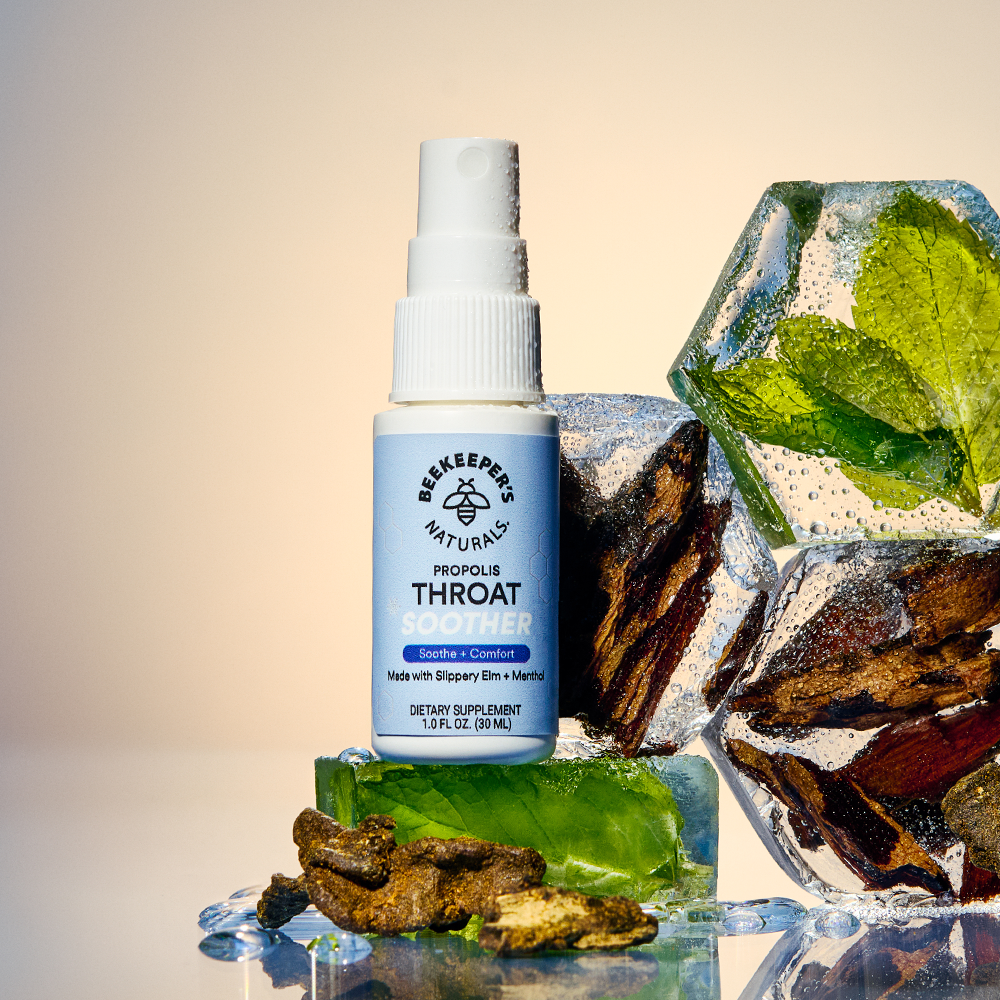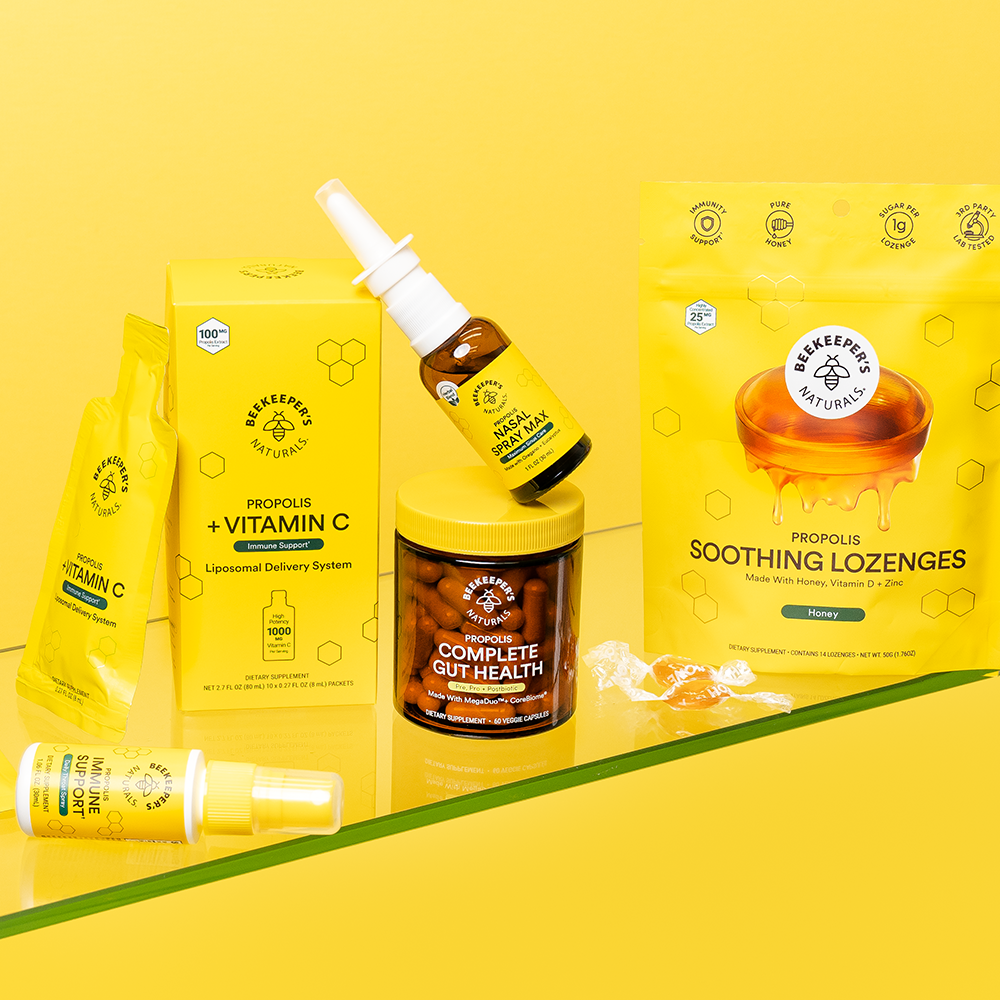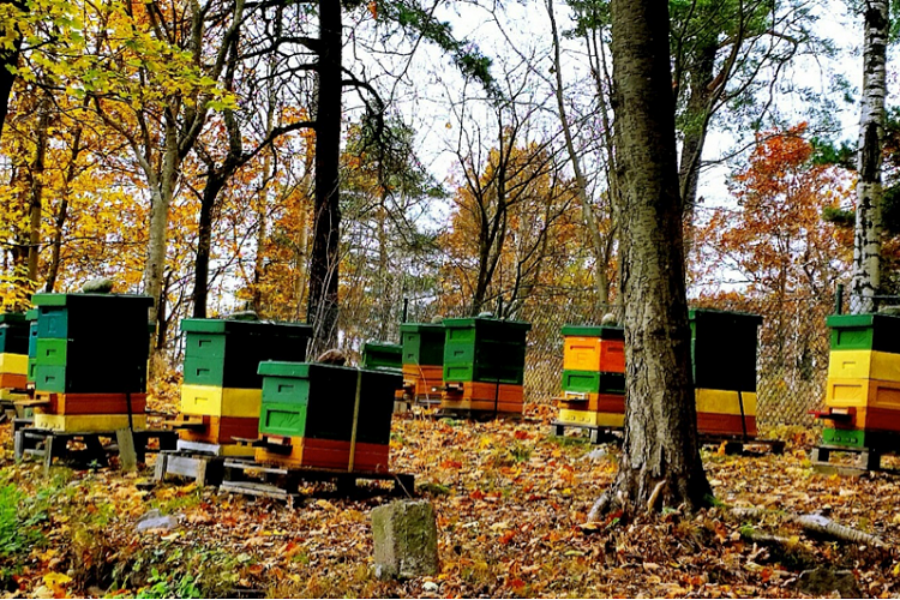In our recent interview with David Craft, a beekeeper from Shermans Dale, Pennsylvania (check him out on Instagram @greening_life_farms), we learned about how beekeeping has changed over the last 3 decades, the tough time he’s been having overwintering his bees lately and what he’s doing differently this year to try to get his first hive through winter. He is also responsible for raising around 75% of every meal that he eats! Full interview below.
How long have you been a beekeeper? What inspired you to start beekeeping?
I started when I was 13 and had bees in Mississippi until I was 17 (1985 to 1989). Four years ago I started again. Both times it was by “accident” or “opportunity” that I started. In Mississippi my Grandfather had 2 hives that sat at the end of the garden. I would sit and watch them fly in and out for hours from a very young age. My Grandparents were always getting on to me for doing this and were worried I would get stung. The bees did not belong to my Grandfather – they were placed there by an old friend of the family. When I was 13, the old man died and his son asked if my Grandfather could find someone to give the hives to. I stepped up and used my savings and bought everything I needed. It was fun and I thought easy even with no experience. I sold 10 working hives at 17 because money and girls seemed to be more on my mind than watching bees. Now I live in Pennsylvania and four years ago my neighbor asked if I would like to take over her hives because it was just too much work for her. I said “yes” and jumped right in. Not sure I would have if I knew how much beekeeping had changed from the 1980’s to 2011.
What was your greatest fear about starting to keep bees or the biggest barrier to entry?
This time I had fears for sure. When my neighbor showed me all the materials that she was just giving me (extra hive bodies, frames, tools, feeders, etc.), I was thrilled that I would have no startup cost. Then, when she opened a very large container in the back that was full of different treatments for mites and diseases with instruction and treatment calendars, the fear I could not do this hit. When I was a boy, the only thing we had to worry about was ants and wax moths. I had never heard of all of these new “worries”. So I had a lot to learn in a very short time, which was a very big barrier, and in the first year I failed miserably. Everyone was saying totally different things about everything and I did not know which way to go. In my first year I lost both hives to mites and Colony Collapse Disorder. Now that I think about it, I should say that I start beekeeping every year because I have yet to get these new bees through a winter. I quit each year when they die and talk myself into starting over each spring.
We absolutely love your beautiful photos of the bees. What inspired you to start taking photos of these little buzzing creatures?
My wife suggested it. She got me hooked on Instagram and it was a way to explain to her what I was seeing in the hive. But now she is in there with me and taking the pictures for me. I think I have her hooked now also.

Tell us three lessons that you’ve learned from the bees.
1. Keep trying! Don’t give up on them because they are very important. 2. Bees know what they need so shut up and listen to them. 3. Bees are more important than honey.
Your Instagram bio states that you focus on a natural way of living. What does natural living mean to you? How is this reflected in your everyday life?
I am in no way a “homesteader” or “prepper” (maybe in a past life), however we try to raise at least 75% of the food we eat or at least buy it locally and know how it was raised and processed. We raise our animals with love and respect. We strongly believe in “natural section” when it comes to our animals and bees. This does not mean that we have them fend for themselves but we allow nature to take its course and give them the opportunity to overcome diseases or pests without much help from us. We are working with the bees to find that one hive that can make it as they would in nature without much help from us. We currently live in an international community that was started in 1972 by 8 families that wanted a farm that could be shared and enjoyed by all. A farm that was pesticide free and a safe place to raise their kids. They were “green” before it was cool. We lucked out and bought a home after a member moved. All I can say is “thank God for Craigslist”. This is how communities should be and how they used to be but we as a nation have outgrown this small way of thinking. We feel accomplished when we sit down to a meal of pork and potatoes, green beans, side salad and homemade ice cream covered in honey knowing the only thing we bought was the flour and seasonings.
How has working closely with bees changed your perception of nature or the world around us?
It has shown me how quick humanity is able to screw up a good thing. Bees have functioned and thrived without us but when we put a “monetary value” on them, we decided we knew better. Beekeepers started out very happy with what they got but greed took over. We started getting rid of low production hives and mean bees. We even decided we could build a better honey and brood comb than they could. We bred bigger gentler bees so we could get the “gold” from them. In turn we made them weak and lazy and susceptible to pest and diseases. To save our investments we started taking care of them to the point they are dependent on us for almost everything. Humanity has done this with livestock and crops to the point that we now have to change their DNA in order just to keep them living and, do not forget the most important part, producing.
You mentioned that you have yet to bring a viable hive through winter. We’re very sorry to hear that! Do you have any thoughts about what the reason could be for this? How have you adapted and what have you changed to try to ensure you get your hives through the coming winter? Our fingers are crossed for you!
I will break down the causes for the overwintering deaths each year: Year 1: As I mentioned earlier, I had no knowledge of mite control or treatments and the hives actually died before winter. I had only had the 2 hives for 3 months at that point. Year 2: I started over with 1 Russian hive and learned some mite control treatments. Everything looked like it was going well but in fall mite levels were so high that infected bees were being killed off by the queen and the non-infected bees. I went into that winter with 1 small weak hive. I decided to wrap them up and it turns out that I wrapped the hive too tight and caused moisture in the hive, which caused them to freeze. Year 3: I started over with 2 hives and decided to buy Varroa Sensitive Hygiene (“VSH”) queens from a local breeder. I split one hive and killed off the package queen and started 2 VSH queens. I did keep the other package queen to see what would happen. I decided not to treat and things started working out better. I had 3 hives and actually pulled honey off as my first harvest. Then, right before winter set in, I decided I might have taken too much honey and I wanted to feed them. That attracted yellow jackets. It was so bad that the package hive swarmed, never to be seen again, and one of the VSH hives lost their queen. I was left with 1 small weak hive to go into winter with. I decided to not wrap, leave the screen bottom open, and make a winter quilt box. All was going very well but the second round of -30 degree wind-chill killed them because I should have covered the bottom since they were off the ground. This year I stopped worrying about honey and focused more on bees. I also made sure to learn from past failures and not keep trying the same things and expecting different results. I also studied Michael Bush and Mike Palmer methods, which I am combining to see what works for me and to ensure that I don’t have to buy another bee ever again. Going into this winter, I have 7 total colonies and only 1 seems weak at this point. I found a neighbor that had a hive that had made it through two winters and got some queen cells early in the summer. I also placed frames without foundation so they would have to build their own cells (which naturally decreases mites). I have not treated at all but I am considering winter feeding on one weak nuc with dry sugar. I will build winter quilt boxes and close the bottom of all hives this year. Then, I will cross my fingers and not sleep much this winter! Hopefully I will have a couple of hives that can take care of themselves and make it through the winter.

Have you noticed any benefits in the changes you implemented this year?
Yes. I think I am finally seeing the effects of letting the bees do what comes natural to them. I have seen little to no mites in my hives, which I believe is due mainly to letting them make their own comb and VSH queens in some of the hives. I did not eliminate the aggressive hives and I have 2 hives I would not dare touch or stand too close to without being fully protected. I believe having these around has stopped the skunks and other animals from bothering them. It also seems to have eliminated yellow jacket issues. In the past, yellow jackets and even carpenter bees were always around the hives and this year I have not seen any. I know mean bees are a pain but they do have their purpose. I look at it like if someone broke into my house and started messing with my family or taking my food, you can believe I would fight until the end to ensure my family would survive. Aggressive bees are really only doing the same thing and I cannot blame them and think that it is a good trait.
What do you have to say to vegans who don’t believe in using bee products? We openly believe that supporting ethical and sustainable beekeepers is an important part of helping the bees and generating awareness, how do you respond to people who question the practices of taking and consuming bee products? What sustainable practices do you incorporate into your beekeeping?
I have no issue with anyone wanting to be a vegan for health reasons. Everyone is different and a lot of things about a vegan diet are most likely healthy. It’s just not for me. That being said, I will argue with anyone that is vegan because the moral values are very hypocritical. They do not eat meat, eggs, milk, honey and use leather products because they strongly believe that they are the result of the direct exploitation of animals. I also believe that they should not eat vegetables or fruit either because of this same “moral value” as some vegetables and fruit can be seen as the result of the exploitation of bees. Also, maybe they should not wear cotton either. I say this because without bee pollination there would not be a lot of fruits, vegetables and cotton that we have today. These products could be viewed as being produced from the exploitation of bees. I do believe that commercial farming practices where bees are brought in to pollinate very large crops is no better than buying meat from a commercial feed lot. So without putting a label on it, I try to buy local and support small farming operations. We raise our own vegetables, eggs, meat, milk, and honey. I still have to buy some products that I know come from big commercial operations and that is just how it is. We are trying to be self-sustainable by raising 75% of our meals and that is the best any of us can do if we not willing to go without. As far as being self-sustainable in our beekeeping, we are trying to raise our own bees and queens. We are doing this by adopting some of Mike Palmer practices such as double nuc bodies and queen rearing. I would encourage any beekeeper to look up Mike Palmer and watch some of his lectures on YouTube.
As a beekeeper, I’m sure that you’ve heard of Colony Collapse Disorder. In North America we have experienced serious issues with CCD over the last decade. How has CCD affected you?
I do not want to get into this question that much. I would encourage every beekeeper to watch the documentary “More Than Honey”. It has changed my outlook on CCD, commercial beekeeping operations and natural beekeeping. I am sure that if you take the time to watch it, it will be an eye opener for you as well.
What bee related lesson or practice do you wish more people would adopt?
I would want to see more natural beekeeping practices put into place and an end to commercial pollination programs. So far Michael Bush seems to take a very common sense approach to natural beekeeping which is easy for me to follow. His website and book have been a valuable tool for me.





